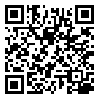Volume 27, Issue 11 (2-2020)
JSSU 2020, 27(11): 2099-2111 |
Back to browse issues page
Download citation:
BibTeX | RIS | EndNote | Medlars | ProCite | Reference Manager | RefWorks
Send citation to:



BibTeX | RIS | EndNote | Medlars | ProCite | Reference Manager | RefWorks
Send citation to:
Farhoodi F, Salehi Fadardi J, Ghanaie Chamanabad A, Mirhoseini S H. Effectiveness of Cognitive Behavioral Therapy based on Exposure and Response Prevention on Patients with Contamination Obsessive-Compulsive disorder and Scrupulosity. JSSU 2020; 27 (11) :2099-2111
URL: http://jssu.ssu.ac.ir/article-1-4973-en.html
URL: http://jssu.ssu.ac.ir/article-1-4973-en.html
Abstract: (4161 Views)
Introduction: The aim of the present study was to compare the effectiveness of cognitive behavior therapy based on exposure and response prevention on the patients with contamination obsessive-compulsive disorder (OCD) and scrupulosity.
Methods: The method was semi-experimental pretest-posttest design by control group. Sixty OCD participants who were suffering from scrupulosity and contamination OCD were diagnosed by means of diagnostic interviewing, Yale-Brown Obsessive-Compulsive Scale and Penn inventory of scrupulosity. They were selected through convenience sampling method and were assigned in two experimental groups and one control group (each group 20). The cognitive behavioral therapy based on exposure and response prevention was performed on the subjects in nine individual sessions for 45 minutes for each experimental group. The data were analyzed using SPSS Inc., Chicago, IL; Version 16 by the multivariate analysis of covariance.
Results: The results of multivariate analysis of covariance and Bonferroni post hoc tests showed that cognitive behavioral therapy based on exposure and response prevention were effective in decreasing OCD in the experimental groups compared to the control group (0.001≥ P). Bonferroni post hoc test showed that there was a significant difference between the scrupulosity group and the contamination group and control group on the obsession variable (0.05 < P). There was no significant difference between the contamination group and the scrupulosity group on the compulsion variable (0.15 < p).
Conclusion: The findings suggest that cognitive behavioral therapy based on exposure and response prevention could help alleviate symptoms of obsessive-compulsive disorder in both religious and contamination OCD.
Methods: The method was semi-experimental pretest-posttest design by control group. Sixty OCD participants who were suffering from scrupulosity and contamination OCD were diagnosed by means of diagnostic interviewing, Yale-Brown Obsessive-Compulsive Scale and Penn inventory of scrupulosity. They were selected through convenience sampling method and were assigned in two experimental groups and one control group (each group 20). The cognitive behavioral therapy based on exposure and response prevention was performed on the subjects in nine individual sessions for 45 minutes for each experimental group. The data were analyzed using SPSS Inc., Chicago, IL; Version 16 by the multivariate analysis of covariance.
Results: The results of multivariate analysis of covariance and Bonferroni post hoc tests showed that cognitive behavioral therapy based on exposure and response prevention were effective in decreasing OCD in the experimental groups compared to the control group (0.001≥ P). Bonferroni post hoc test showed that there was a significant difference between the scrupulosity group and the contamination group and control group on the obsession variable (0.05 < P). There was no significant difference between the contamination group and the scrupulosity group on the compulsion variable (0.15 < p).
Conclusion: The findings suggest that cognitive behavioral therapy based on exposure and response prevention could help alleviate symptoms of obsessive-compulsive disorder in both religious and contamination OCD.
Keywords: Scrupulosity, Contamination obsessive-compulsive disorder, Exposure and response prevention
Type of Study: clinical trial |
Subject:
Psychology
Received: 2019/09/8 | Accepted: 2020/03/10 | Published: 2020/03/10
Received: 2019/09/8 | Accepted: 2020/03/10 | Published: 2020/03/10
Send email to the article author
| Rights and permissions | |
 |
This work is licensed under a Creative Commons Attribution-NonCommercial 4.0 International License. |







